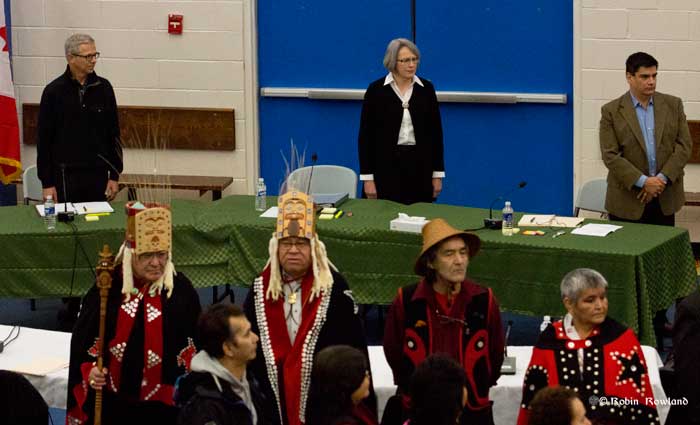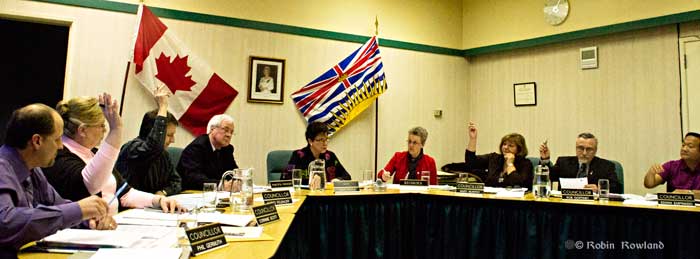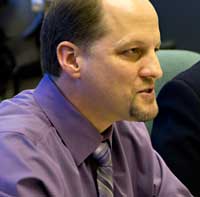
The members of the Northern Gateway Joint Review must now justify their jobs and the existence of the panel, now that the government will likely overrule any recommendations they make about the controversial pipeline, Nathan Cullen, NDP House Leader and MP for Skeena Bulkley Valley said Friday, April 20.
Ever since the Joint Review hearings began in Kitimat in January, witnesses have repeatedly challenged the panel about the fairness of the proceedings, whether or not the panel is rigged in favour of the pipeline and whether or not the government will listen to the panel.
Chair Sheila Leggett has always ruled the questions out of order or cut off the witness.
Now that the government has said that it doesn’t have to abide by any decision or provisions from the Joint Review Panel, Cullen says that the panel members must make it clear where they stand.
“I think it’s a fair question. It was always there though. You’ve been to the hearings, people have been asking the question does any of this matter? Are you guys actually going to listen and is anyone going to listen to you, the panel, is the government going to listen?
“So the question has been out there and unfortunately it’s been confirmed in the negative. I don’t want dissuade people from showing up. Because it is about our voice, it’s about being able to express yourself publicly.”
Cullen said that he believes that people must continue to participate in the hearings, even if they are cut short by the government, because what the Conservatives really want is for people to abandon the political process.
Cullen was answering several questions from northwestern reporters during a regular conference call, where the reporters noted that many residents of the BC northwest are wondering if attending the hearings are worth it.
“This is a forum that we’re paying for, it’s apparently going to continue on. So when I sit in front of the panel, which I’m planning to still do, I’ll have a question for them, which is: ‘Did you know this was coming? And now that it’s happened do you feel that you’re even credible? Do you still exist, if your mandate has been ripped away from you?’
“If I was one of the panel members, those are answers I’d be wanting from the minister, [Minister of Natural Resources] who assigned them all, who appointed them all because they are great and smart people who should be making a decision, [Now] the government doesn’t think they’re so smart after all.
“It’s like ripping a judge off the bench half way through the trial. You must have a reason. Either you don’t like the evidence that was coming forward or you didn’t like the judge or you never believed in the process. I don’t know which one of those are true for the government, but one of them is.
“Things have changed, normally you wouldn’t have a judge asking questions about a judge’s mandate because it is obvious that the judge has authority.
“Well, the judge’s authority just got absolutely stripped away. So is that a question for the judge? I think so.
“I don’t really expect them to answer, they’re going to have to say something to somebody about why they’re still there. Why are we still spending this money if the government is going to listen to science or to the opinions of the people who are impacted?
“The public still has a right to speak , despite what this government thinks. I’ve always said that the people impacted by this project should be the ones making the final decision, and not a prime minister from Calgary,” Cullen said.
“In terms of our voices, I don’t know if it’s in the hearing or in the general discourse of our country, that’s what they want you to do, they want young people to turn away, they want people to say that none of this matters, it’s all very cynical. I am committed to not allow myself to feel that cynicism and just double down in our efforts. It’s about a pipeline, but it’s about so much more. It’s about whether we get to participate in the way our country functions. And we do and we will despite the Conservative view of the world might be.
“It’s a question that everyone who wants to participate will answer for themselves. I think the nature of the forum will change, [now] it’s a way to connect with neighbour with neighbour.”

















